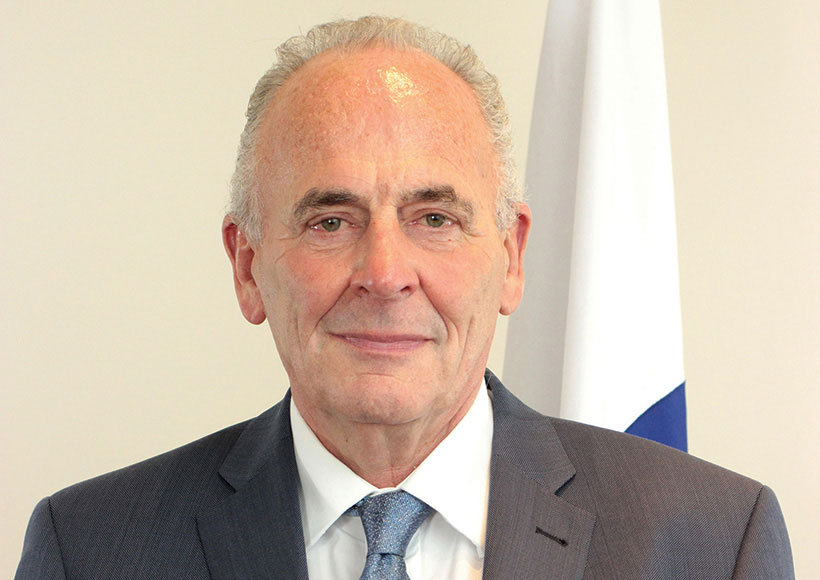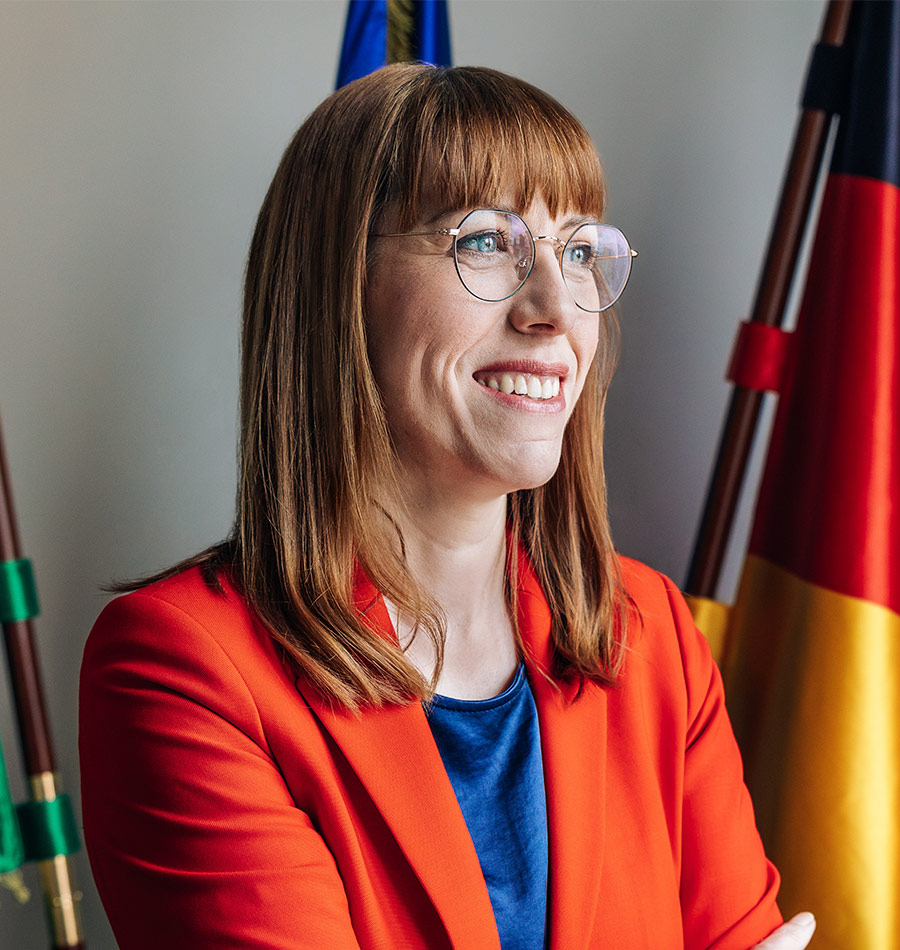Interview
Peter van der Sande
President of the International Corrections and Prisons Association (ICPA)
How is it to be the President of the only global community for correctional professionals?
PS: It’s great, very interesting and I’m privileged to work with very dedicated and committed Board members, who, in spite of having very busy jobs, do a lot of voluntary work. The same applies to the staff and members of ICPA. It’s remarkable that in this field I’ve always met so many very self-driven people.
Having become ICPA’s president at the end of 2011 was a nice transition from my previous job. I was Head of the Dutch Prison Service for nearly 12 years, and my interest for the transnational cooperation started at the beginning of that career when I visited East European countries with some of my governors and they showed me how they were assisting them in improving their systems.
At that moment I recognised that sharing knowledge and practices could really make a difference, and, for my staff, it was also an enrichment. I used to tell my staff that we’re fortunate to live in a country where we had a well-developed prison system and that it’s actually a moral duty for us to help countries that don’t have as many resources. Those visits made me enthusiastic about international work, so I was very happy to have been elected President of ICPA.
What is the core mission of the ICPA?
PS: Our main aim is to promote policies and standards for humane and effective correctional practices, assisting in their development and implementation.
We support corrections and prison professionals to improve professionalism and we want to provide an inclusive, safe and secure platform for the exchange of knowledge, best practices, technology, and innovations.
Moreover, we promote and share ethical and effective correctional practices to enhance public safety and healthier communities worldwide. We believe that imprisonment is to be used as a last resort, therefore we support the development of alternative sanctions and community corrections.
We believe in integrity, professionalism and in the sharing of knowledge. Finally, we strongly believe in the capacity for positive change, and in the dignity of individuals; it’s our duty to protect their rights.
What are the main challenges at this point?
PS: The world is changing at a dramatic pace; there’s technological change – which is in itself a major driver of change – and there’s cultural shifts and global financial crises.
However, next year is ICPA’s 20th anniversary and we face the future on a positive footing. We have a solid foundation consisting of a strong team and a great wealth of expertise, so ICPA will continue to exist to promote best practices in corrections in a world where we will face greater challenges and pressures than ever before.
It’s important that the ICPA ensures to remain fair, inclusive and open so that we can stand united and together to be the voice that represents professional corrections.
We believe that imprisonment is to be used as a last resort. We believe in integrity, professionalism, and in the sharing of knowledge.
What’s your approach to advocating the advancement of professional and humane corrections globally?
PS: I’m always trying to show that there are other ways of doing things, especially when it comes to dealing with prisoners. Every time I’m in another country or conference, I try to show that locking up people by the sake of punishment doesn’t work and that it’s really important to prepare people for a new life in society.
This is not only an issue for developing countries, we need to raise general awareness within the civil society even in the western countries. There’s still public scepticism directed at people who have served a prison sentence, and unfortunately the media often tends to reinforce the logic of revenge or further punishment beyond just the loss of liberty, by critically reporting new prison infrastructures and the “soft” treatment of prisoners – this can result in unnecessary political pressure, have a negative impact on the way prisons work and in the successful reintegration of ex-offenders.
Furthermore, I think that besides the staff-prisoner relationship – which is key to prison quality – professional and humane prisons start when the society accepts that people who have served a sentence deserve to get a second chance and that society is responsible for helping them.
The mindset of the community plays an important role in the success of the correctional system and its ability to reintegrate offenders. Actually, one of my wishes for the 2019 ICPA conference would be that its theme will focus on the involvement of the civil society.
A substantial part of our prison population may not pose a risk to society and therefore we should be looking for alternatives to imprisonment and for the decrease in prison sentences especially for minor offences. Prison overcrowding is a real problem that is often caused by high pretrial rates and large numbers of short prison sentences.
Everybody knows that short prison terms can result in huge collateral damages for the offenders, families and the community, moreover research supports the premise that many low-risk offenders are more likely to re-offend if incarcerated. I try to highlight this everywhere I can and to ask policymakers to consider the use of alternative sanctions.
In the interest of decreasing incarceration, there must be more alternatives to detention and greater innovation in technologies and approaches that make these more viable options for sentencing.
We must remain cognizant of the positive role that prisons play in keeping our societies safer, in protecting our communities and in the proper care, treatment, education and rehabilitation of those who do require to be imprisoned, but imprisonment must always be used as a last resort.
Locking up people by the sake of punishment doesn’t work.
How is ICPA’s relationship with organisations such as the United Nations in promoting correctional good practices and minimum standards?
PS: It’s a very close and strong relationship. ICPA has a Special Consultative Status with ECOSOC – the Economic and Social Council of the UN – and we have representatives at the meetings of their Crime Commission.
Moreover, we were active within the UN committee of experts in the discussion and development of the updated Mandela Rules and the Bangkok Rules. We have developed checklists for both rules so that nations or individual institutions can use them to see if they comply with these rules or if they need to take action to enhance their compliance.
We have developed a set of training lesson-plans for correctional workers and each of these plans is checked against the UN standards and norms. In fact, all of our objectives are aligned with the United Nations in promoting good practices and minimum standards.
ICPA continues to be consulted by UN staff as new correction-related initiatives are being considered, and, reciprocally, we work to promote UN efforts and support their Sustainable Development Goals.

Peter van der Sande with the award-winning Pedro das Neves,
flanked by Peter Severin and Michelle Carpentier
And how is the ICPA’s relationship with partner agencies such as the Confederation of European Probation and EuroPris?
PS: I am happy to be able to say that we work closely together with EuroPris and CEP. In 2017 we have organised the 1st International Correctional Research Symposium, together with EuroPris.
It was a very positive initiative – attended by more than 120 delegates from 36 countries coming from academic, public, private, and not for profit organisations – so we’re working again in partnership with EuroPris to organise the 2nd edition of the Symposium, which will be held in Prague, May 8th-10th 2018.
Previously we have also worked in partnership with EuroPris and CEP in organising the vastly popular Technology in Corrections conferences. The last one (2017) attracted more than 200 delegates from 37 countries and the aim of the conference was to challenge the private sector to develop innovative digital solutions for use in corrections. The third edition of this conference is being planned for 2019; again, it’ll be the result of a tripartite effort and testament to the added value of working together.
Apart from the aforementioned organisations, ICPA welcomes collaborative efforts, and, over the years, has developed strong partnerships with many others, including ICRC, ACA, APPA, IACFP, ACSA, ICCA, ASCA, to name a few.
The challenges in the corrections’ sector are both vast and complex, hence, pooling our resources and efforts through partnerships is vital in order to effect change.
Which achievements would you like to highlight?
PS: No achievement would have been possible without the Board members, staff, and members! When I started my presidency I had three main goals. The first was to make ICPA financially stronger and we made big steps forward in that respect. The second was to establish regional chapters because it’s important to focus on regional issues taking specific problems, culture, legislation, etc. into account. We now have three regional chapters (North America, Latin America, and Africa) and we’re trying to establish one in Asia.
The third objective is ongoing and has to do with making ICPA more visible – we want to show the world that we are the leader in advancing professional corrections internationally; we encourage the support and contributions from experts worldwide, we want to grow and nurture our community and expand our reach.
Furthermore, I’m very proud of the growth of our annual conference; the last one (October 2017, in London) attracted more than 700 delegates from 80 countries. This means that the willingness to reform correctional systems is clearly present and that participants see our event as one where they can learn and then transfer that knowledge to their systems.
The annual Correctional Excellence Awards are also quite an accomplishment as we feel that it is crucial to give recognition for achievements in the field – Pedro das Neves, the founder, and director of JUSTICE TRENDS received an award during our 2017 Conference. Our Awards Programme is becoming well recognised and year on year the number of good nominations are increasing.
I should also mention our thematic ‘Networks’; these are groups of members and experts who actively participate in activities/discussions that support the work of ICPA. Then, last but not least, our “Advancing Corrections Journal”; it’s a peer-reviewed publication that provides an international forum for the dissemination of new research, policies and practices related to advancing corrections worldwide and it’s on its 4th issue.
ICPA will continue to exist to promote best practices in a world where we will face greater challenges.
How do you comment on ICPA’s evolution and how do you see it in the future?
PS: ICPA has a strong basis and a promising future. We’re growing and steadily doing more and more; we now have a network of thousands of corrections professionals and a whole host of initiatives and events to serve them.
Two years ago we presented our strategic goals for the years to come and we had identified three key-priorities including “delivering world-class conferences”, “facilitating transformational leadership training” – which has been started in Africa – and “facilitating the implementation and delivery of evidence-based interventions”.
We’ve established this overarching vision to guide our way forward.
It is my hope that ICPA will continue to be recognised internationally for inspiring organisations, volunteers, groups, and individuals to advance the principles and practices of evidence-based, professional correctional services; and for empowering practitioners, service-delivery personnel, policy makers, academia and private sector suppliers to be creative, to value all ideas and to accept and learn from mistakes.
ICPA functions as a global platform allowing for the innovation of approaches, ideas, and solutions aiming at the development, implementation, and monitoring of practitioner-oriented professional correctional services.
We are now planning for our 20th-anniversary conference that will take place on October 21-26, 2018, in Montreal, Canada. This will be a great opportunity to shape the Association’s future for the next 20 years.
Peter van der Sande
President of the International Corrections and Prisons Association (ICPA)
Peter van der Sande is the President of ICPA since 2011. Prior to being elected as ICPA’s president, he was the Director General of the Custodial Institutions Agency of The Netherlands for twelve years, managing prisons, correctional institutions for juvenile offenders, and forensic psychiatric centers. Before, he worked in various management positions in The Netherlands government for more than two decades.


